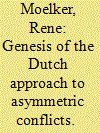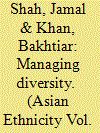| Srl | Item |
| 1 |
ID:
127812


|
|
|
|
|
| Publication |
2014.
|
| Summary/Abstract |
From a theory on occupying regimes and from traditional concepts of counterinsurgency theory, the author traces back the development of the Dutch discourse regarding present day missions. The genesis of the so-called Dutch approach is studied, and the case of Uruzgan is reviewed by scrutinizing political, security, economic, and governance aspects of the use of the military in the aforementioned province of Afghanistan. The case is studied to determine whether there really is something Dutch about this approach. We learn that the "Dutch approach" is predominantly a narrative whose main objective is the appeasement of Dutch public opinion and the legitimation of Dutch policy making. At the same time and even though more comparative case studies are necessary, it seems plausible that the Dutch approach is different. But the difference is not typical Dutch; it lies in the manner of collaborating with and co-opting indigenous elites. Studying the genesis of the "Dutch approach" is therefore an analysis of a discourse and a study in operational effectiveness at the same time.
|
|
|
|
|
|
|
|
|
|
|
|
|
|
|
|
| 2 |
ID:
191787


|
|
|
|
|
| Summary/Abstract |
Modern societies are confronted with a plethora of issues that have far-reaching socio-political ramifications. The negative effects of diversity are primarily the result of state policies. Where societies were not homogenous, attempts were made to bring desperate populations together to advance official nationalist projects. Pakistan, being dominantly a Muslim state, has religio-cultural and ethnic diversity where minority groups have raised their voices against the unjust state’s policies. This study examines how these issues evolved over the course of Pakistan’s history. The paper attempts to answer the question ‘why has Pakistan’s plurality become unmanageable?’ The results demonstrate that a high degree of centralization of authority, the adoption of Urdu as a national language, a sense of domination of the central institutions by the Punjabis, underrepresentation of ethnic minorities in state institutions, and controlled society has aggravated the position of diverse groups in Pakistan, with colossal consequences to national economy and social harmony.
|
|
|
|
|
|
|
|
|
|
|
|
|
|
|
|